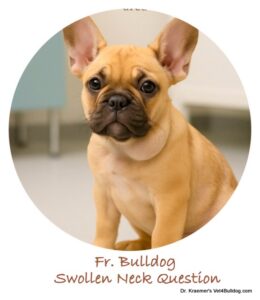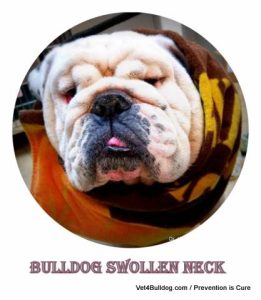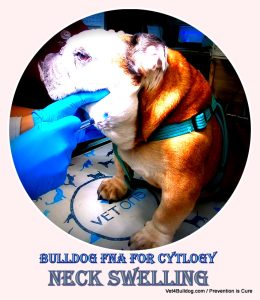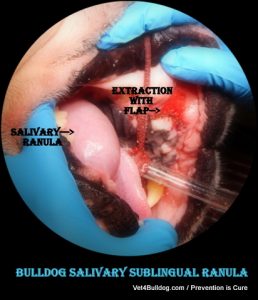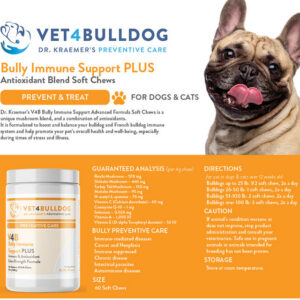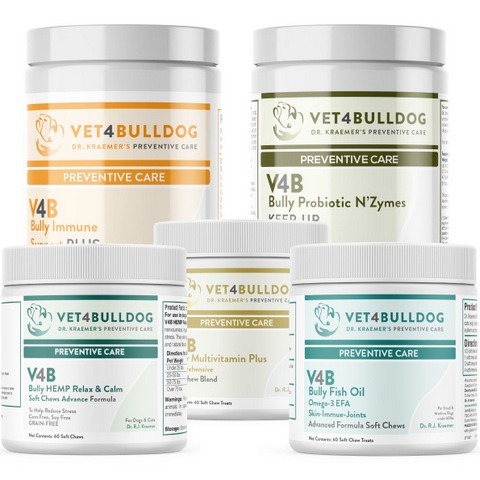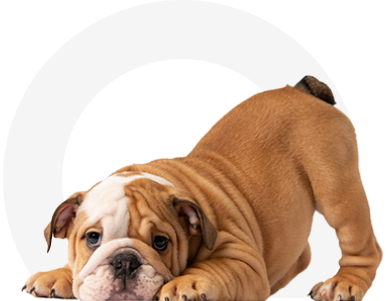French bulldog swollen neck lymph node cancer question
Dear Dr. Kraemer,
I’m reaching out with deep concern about my Frenchie, who is truly the love of my life. Recently, I noticed swollen lymph nodes in his neck, and I’ve been very worried.
Our vet prescribed a course of amoxicillin, which we completed, but the swelling—or what seems like a lump—is still there. He performed a needle biopsy, and thankfully, the results came back as non-cancerous. Still, the lump hasn’t gone away.
It is concerning, and I know the doctor is more than qualified to help with this. What should I do?
He is a very active dog, and he is very special to me.❤️
My boy will be 2 years old in July and has otherwise been very healthy. I would really appreciate any guidance or insight you can offer.
Thank you so much,
Angel & Max 🐾
Answer to French Bulldog Swollen Neck Cancer Question
Dear Angel and Max🐾
First of all—what a face! Max is absolutely precious, and we can see why he has your whole heart.❤️
Thank you for sharing his photo—he’s got “bulldog calendar cover model” written all over him.
What Can Cause a Swollen Neck in French Bulldogs?
Now, let’s talk about that swelling on his neck, because I know how stressful it can be when something seems off.
At his age (2y)—and being otherwise healthy—the good news is that cancer is not the likely cause.
BULLDOG LYMPHOMA CANCER
Lymphoma (a common cancer involving lymph nodes) typically causes multiple peripheral nodes to swell, not just one.
An example would be:
- Submandibular: under the jaw, on both sides of the neck
- Popliteal: behind the knees
- Prescapular: in front of the shoulder
- Axillary: your bulldog armpit
NON-CANCER FRENCH BULLDOG NECK SWELLING CAUSES
When we see just one swollen lump in the neck of a young, otherwise healthy Frenchie like Max, it’s usually not cancer. Instead, we’re more likely dealing with one of the following:
- Reactive or Infected Lymph Node (Lymphadenopathy/Lymphadenitis):
This is the body’s immune system doing its job. The lymph node swells in response to inflammation or infection nearby—think of it as a “red flag” saying, “Something’s up!” - Abscess (Infection Pocket):
A warm, sometimes painful swelling caused by pus building up under the skin. This can be due to:- A dog bite (even a playful one)
- A cat scratch
- A foreign object, like a foxtail or splinter, that got under the skin
- Allergic Reaction (Localized Edema):
Insect stings, spider bites, or bee stings can lead to sudden swelling that looks scary but may resolve quickly with the right treatment. - Seroma or Hematoma:
These are fluid-filled lumps that come from trauma, either clear serum (a seroma) or blood (a hematoma), caused by a bump, rough play, or a fall. They often feel soft or squishy. - Salivary Mucocele:
This is a common cause of persistent swelling in this area. It happens when a salivary gland or duct leaks, forming a balloon-like fluid pocket. It’s not dangerous, but it usually won’t go away on its own and may need to be removed
How Can I Find Out What’s Causing My Frenchie’s Neck Lump?
Getting to the bottom of your Frenchie’s neck swelling usually involves a few key steps. Your vet will guide you based on what they find during the exam, but here’s what the diagnostic process often looks like:
- Veterinary Exam (Hands-On Check):
It starts with a thorough physical exam, including gentle palpation (feeling) of the lump and checking for other signs of illness or swelling elsewhere in the body. - Needle Aspiration & Cytology (Microscopic Analysis):
A fine needle is used to draw out cells or fluid from the lump. These are examined under a microscope to look for signs of infection, inflammation, or suspicious cells. ✅ If your vet already did this and it came back non-cancerous, that’s a great first step and often very reassuring. - Biopsy (Tissue Sample for Histopathology):
If there’s still uncertainty, especially if lymphoma or a tumor is a concern, your vet may recommend a core biopsy (called a “tru-cut”) or surgical biopsy. The tissue sample is then sent to a lab to check for any abnormal or cancerous cells. - Culture & Sensitivity:
If an infection is suspected, your vet might send a sample for culture to identify the exact bacteria (or other organisms) involved, so the right antibiotic can be chosen. - Imaging (X-ray, CT, or MRI):
In some cases, especially when a deep structure like a salivary gland is involved, advanced imaging may be recommended. This can help pinpoint the exact location and cause of the swelling, especially if surgery is being considered.
What is a French Bulldog Salivary Mucocele?
But because the swelling didn’t go down after antibiotics, it’s a good idea to take the next step and confirm whether this is a mucocele (salivary gland leak).
Mucocele is a build-up of saliva or mucus, usually due to minor trauma to the salivary gland or duct.
Mucoceles often come from the parotid gland, which sits right around the area where you’re seeing that lump. They’re not harmful in themselves, but they don’t usually go away on their own, and they can get bigger or become uncomfortable if left alone.
It can also show up under the tongue (sublingual mucocele)
HOW TO TREAT A FR. BULLDOG SALIVARY MUCOCELE?
If your vet confirms this is a mucocele, treatment usually means surgically removing the affected salivary gland and duct.
Here are a few things you should know—and that I tell all my bulldog moms and dads:
⚠️ Experienced Vet: The procedure should always be done by a skilled, experienced veterinarian. 🚨This area has some very important structures nearby—including facial nerves and major vessels—so precision matters.
Don’t worry about Max missing that gland. Dogs (like humans) have multiple salivary glands, including one on the opposite side that will take over. He’ll still have more than enough drool to spare—he is a Frenchie, after all. 😉
✅So take a deep breath—you’ve done everything right so far, and this likely has a good outcome. Just be sure your vet is confident with this type of surgery, or ask for a referral to a surgical specialist if needed.
💞 Give Max a kiss on that squishy face from all of us.
Warm hugs and bulldog snuggles,
Dr. Kramer, Vet4Bulldogs🐾




